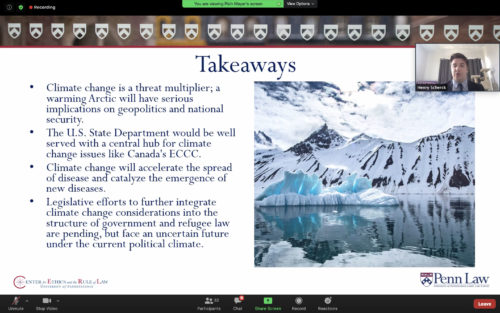Election security, the COVID-19 pandemic, violent extremism, climate change – this reads like a collection of some of the most daunting and urgent problems of our time. But these are just some of the real-world challenges more than a dozen law and graduate-level students grappled with at this summer’s CERL Summer Internship Program.
The program, run by Penn Law’s Center for Ethics and the Rule of Law (CERL) in partnership with the Annenberg Public Policy Center (APPC), is designed to prepare law and graduate-level students for a career in the national security field. It provides them with a foundation so that future perspectives, leadership, and decision-making are always grounded in ethics and the rule of law.
This year, the fourth year of the program, 14 students – eight from Penn Law, five from other graduate programs, and one Penn undergraduate – met virtually for two months with leading authorities in national security. The 2020 CERL summer interns conducted research, drafted reports and articles, and presented their findings.

“It’s about exposing the students to some of the most prominent individuals in the field while working on current issues of national security facing our country,” said Richard Meyer, interim executive director of CERL.
Divided into seven groups, the students worked on different issues, most of which will be covered in forthcoming CERL conferences. The group on election security, for instance, wrote a blog post (Ballots are secure, knowledge on vote-by-mail is not) and worked on documents for a Sept. 17 conference on election security cosponsored by CERL, APPC, and the Center for a New American Security (CNAS).
Under the direction of Meyer and CERL senior fellows Christopher Jacobs and Alexandra A.K. Meise, other groups looked at such issues as the effects of climate change on national security (the focus of an Oct. 1 CERL-APPC conference); nuclear threat escalation (for an April 2021 conference); and the legal issues surrounding Guantanamo Bay and the global war on terror (for the 20th anniversary of 9/11).
Three times a week, Meyer noted, the students took part in Zoom talks given by the likes of James Clapper, former U.S. director of national intelligence; Richard Painter, who was the chief White House ethics lawyer in the George W. Bush administration; and Carrie Cordero, general counsel at CNAS.
In addition, two of the intern groups developed proposed curricula for APPC’s Annenberg Classroom, which offers free, high-quality resources for teaching the Constitution to middle and high school students. “What we’re trying to do is teach core constitutional concepts using real-world fact scenarios,” Meyer said. “In one case, we looked at issues of election security that are being raised in 2020 to teach about the constitutional issues within the electoral process. In the other, we used the COVID-19 pandemic to teach federalism.”
The CERL summer interns presented their final work over Zoom on August 21, 2020, at the conclusion of the summer program, before program leaders and guests, including Clapper (who is a CERL executive board member) and Painter (who is on CERL’s advisory council).
“When the pandemic hit, at first I thought we’d have to cancel” the program, CERL founder and faculty director Claire Finkelstein told the virtually assembled audience. But the interns’ work this year “is the highest quality we’ve ever seen,” she said. “It’s remarkable, what they’ve been able to do.”


